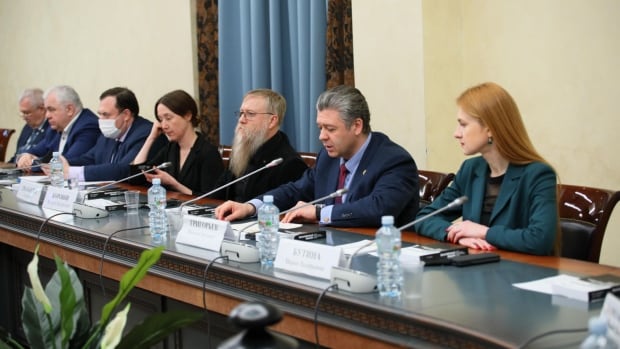
In Russia, a 'sham tribunal' investigates what it says are Ukraine's war crimes
CBC
Standing in a war-ravaged suburb outside Kyiv last April, a prosecutor for the International Criminal Court proclaimed: "Ukraine is a crime scene."
In the months since, more than three dozen investigators on the ground and a team of lawyers in The Hague have been working to uncover evidence of possible war crimes committed as part of Russia's brutal invasion of its neighbour.
Meanwhile, in a pale yellow conference room in central Moscow around that same time, a very different inquiry was beginning: the International Public Tribunal on Ukraine.
It is the project of Maxim Grigoriev, a member of the quasi-governmental Civic Chamber of the Russian Federation. Its stated goal is to "collect data and prove the commission of war crimes by the Kyiv regime, discrimination against its own citizens, and persecution on linguistic, national and ideological grounds."
The tribunal has held a series of hearings and news conferences since April, with Grigoriev producing and releasing videos of his tours throughout occupied Ukraine.
Opening the tribunal, Grigoriev blasted the Ukrainian government as responsible for "murders and repression," a "huge wave of neo-Nazism," and the "persecution of the Orthodox Church." But, he said, the ICC "simply refuse[d] to accept" all this supposed evidence — which propelled him to hold his own hearings.
Seated alongside Grigoriev at the chamber's horseshoe-shaped conference table was Russia's secret weapon in their effort to bill themselves as the victim: Westerners.
Grigoriev had invited Americans, Canadians and Europeans living in Russia to present their own evidence of Ukraine's alleged crimes, boasting that more than 20 countries were represented at the tribunal.
Since April, the tribunal has pumped out video in English and Russian to domestic social media sites, like VK and Rutube, and to YouTube — collectively racking up millions of views.
But experts say the tribunal is Moscow's way of combating and discrediting legitimate efforts to hold soldiers, generals and politicians to account for very real atrocities taking place in Ukraine.
And given that many of Grigoriev's so-called star witnesses have a history of spreading disinformation, there is concern that, as the war drags on, the tribunal could be a powerful propaganda tool for Russia.
"It is pretty crucial to understand that the Russian domestic audience does really matter here," said Tim Squirrell, head of editorial and communications at the Institute for Strategic Dialogue, a think-tank that studies Russian disinformation.
"One of the reasons that you'll bring in foreign influencers to testify — in front of what is, effectively, a sham tribunal — is to try to show the Russian people, the domestic audience, that other people are also on their side."
Since the start of Russia's invasion, investigators — both professional and amateur — have documented evidence of war crimes in Ukraine.













